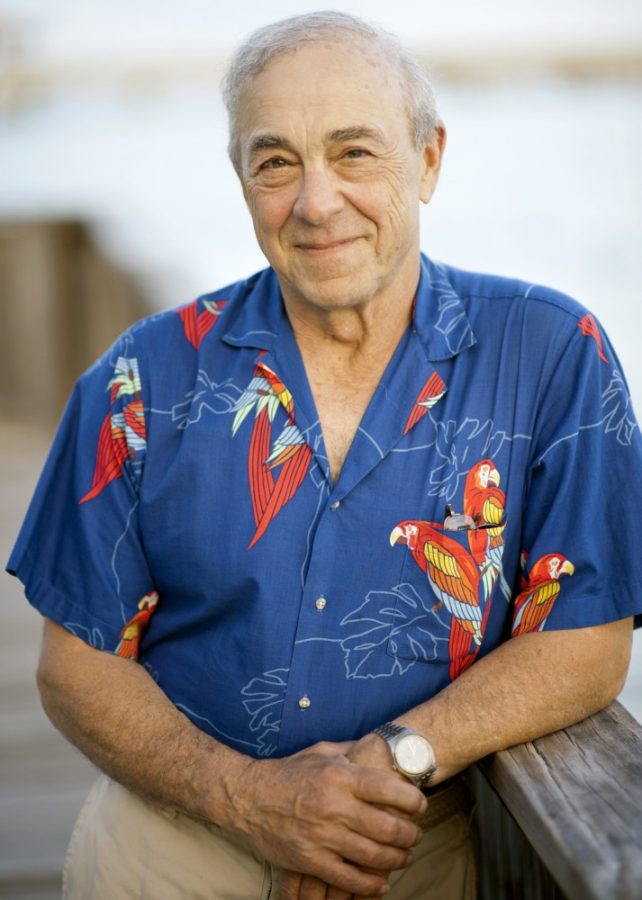A desire for adventure seems to be another one of those inherent qualities human beings possess. It is a desire to know more about the human condition outside of one’s own realm of comfort and understanding. It is an insatiable hunger to feel, touch and smell new places. And for those who write about their experiences, they might find that they create a whole new self — compiled from the pieces of the world and the people they just can’t forget.
To travel across the nation while writing about the different people one meets and the different places one sees is probably a life goal for many people, but few get to do it as a profession. However, author and former journalist Philip Caputo, who will be present at the Tucson Festival of Books, got to do just that while gathering information for his novel, “The Longest Road.”
Accompanied by his wife and two dogs, he packed up his trailer and truck and set out for his very own adventure.
As a journalist, Caputo’s articles graced the pages of acclaimed publications such as the The New York Times, the Chicago Tribune and National Geographic. However, Mort Rosenblum, a professor at the UA School of Journalism, offered some insight into the reasoning behind Caputo’s journey from journalist to novelist.
“The thing about Phil is he started out as a really honest reporter,” Rosenblum said, “[He] admitted that he was also doing it because he was kind of looking for himself and looking for some reaction to it. At the point where he kind of realized … all these … feelings and observations and just general sense of the human being was getting into his reporting, he switched to fiction.”
However, Rosenblum believes that Caputo’s time as a journalist only strengthened his skills as a novelist.
“As such, we have a really good example of a guy who gets it from having seen things up close,” Rosenblum said, “but also [someone] who can step back and, not so much invent things, but at least tell [the story] … with actual facts.”
Caputo got the chance to delve into the different facets of human beings during his road trip from Key West, Fla., to Deadhorse, Alaska, for “The Longest Road.”
“The most interesting part of the journey was traveling to the Pine Ridge Indian Reservation in South Dakota,” Caputo said. “[It] is plagued by a lot of the problems that most Indian reservations are — mainly unemployment, alcoholism, drug addiction, youth suicide. [B]ut meeting a Sioux Indian gentleman there who was both a successful entrepreneur as well as being a [member in the] traditional [Oglala] … Sioux [Tribe whose] … name was Ansel Woodenknife … was probably the most interesting part.”
Tired from traveling, conducting interviews, maintaining a travel journal and taking care of the vehicle, Caputo’s adventure wasn’t always intensely exciting. However, Caputo did recall a certain adrenaline-pumping moment on a Canadian highway with a herd of wood bison.
“There’s only about two or three thousand left, and to see a hundred of them in a single herd was quite something,” Caputo said. “The herd bull charged the car in front of us, and the car got out of the way just in time.”
Caputo’s adventures include much more than the trek he made for “The Longest Road.” Immersed in the action of the Vietnam War, Caputo served as a Marine and as a war correspondent.
“Philip Caputo is one of those rare journalists and novelists whose experience with Vietnam spans that awful era,” said Joe Sharkey, Vietnam veteran and columnist for The New York Times.
His experiences with danger did not stop there. For his novel “Crossers,” Caputo said he traveled to a site that has seen enduring strife since the 1850s — the U.S.-Mexico border.
“I had to go down into Mexico a couple of times in fairly dangerous places,” Caputo said. “I was a foreign correspondent for many years, so I was kind [of] used to dangerous places, but nevertheless, the challenge there was always … [to] try to … see what was going on without attracting too much attention.”
Caputo found creative ways to overcome this challenge.
“On one of those four [days] down South, I was with an undercover agent from the U.S. border patrol,” Caputo said. “We were posing as magazine journalists, pretending we were taking pictures of the desert or something like that.”
During his time in Mexico, Caputo said that he got some insights from the immigrants he met.
“It’s quite an eye-opener to see the level of poverty that exists only 200 miles south of our border,” Caputo said. “You can’t blame anybody that’s living like that who sees a chance or a shot at bettering themselves for taking it.”
Caputo’s event, called “Elasticity Can Give Nonfiction Bounce,” will be held on Saturday in the Student Union Memorial Center in the Kachina Lounge.
“I believe it’s going to be mostly a discussion on the … creativity that goes into nonfiction writing and the limits to creativity in nonfiction,” Caputo said.
While Caputo encourages aspiring journalists to “think twice” about pursuing that career path, he said that he found and still finds the profession to be very gratifying. When asked if he had any regrets about his career, Caputo responded, without hesitation, that he didn’t have any.
“I used to look forward to going to work,” Caputo said. “I just loved it, and I consider myself an extremely fortunate person to have been able to do that, because most people don’t.”
_______________
Follow Madison Scavarda on Twitter.









